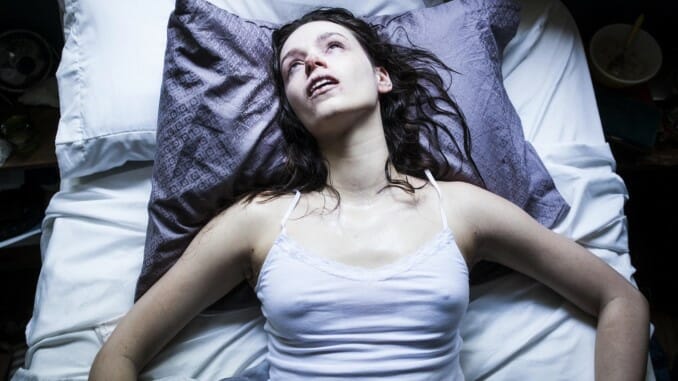ABCs of Horror 2: “S” Is for Starry Eyes (2014)

Paste’s ABCs of Horror 2 is a 26-day project that highlights some of our favorite horror films from each letter of the alphabet. The only criteria: The films chosen can’t have been used in our previous Century of Terror, a 100-day project to choose the best horror film of every year from 1920-2019, nor previous ABCs of Horror entries. With many heavy hitters out of the way, which movies will we choose?
There’s a kind of expectation among horror fans that the average piece of horror cinema should entertain as much as it terrifies; should titillate as much as it repulses. The most visceral nature of the genre is only fleetingly embraced in truth, because the average fan doesn’t often want to descend completely into unrestrained cruelty, sadism or social commentary. Each thrust of the knife is primarily meant to send a giddy little misanthropic thrill through the audience, not make them feel genuinely uncomfortable or burdened with excess empathy for the body being torn apart by the blade. As Paste movies editor Jacob Oller recently observed in a conversation about the genre, “most people want ‘fun’ horror, not ‘ruin your night’ horror.”
Starry Eyes is unabashedly the latter, and that can’t help but limit its mass appeal on some level. Kevin Kölsch and Dennis Widmyer’s 2014 psychological horror thriller is a story of sacrifice and transformation in the name of achieving one’s ambitions, at the cost of your soul. It’s an obvious metaphor for the way the Hollywood system chews up, degrades and spits out its would-be talent as they debase themselves in an effort to break through, abandoning whatever ideals they once possessed in the process. It’s a film about Tinseltown’s ability to psychologically break all who dare to dream, and rebuild them into something far worse. And the last word that anyone is using to describe it is “fun.”
Starry Eyes is the story of Sarah (Alexandra Essoe), an aspiring leading lady stuck in the same kind of dead-end waitressing job as so many thousands (or millions) of other L.A. inhabitants. She treads water in her soul-deadening work, searching for auditions that seem perpetually out of reach, obviously inadequate among a sea of other young women who look and sound exactly like her. Sarah has a dream, but she has no dynamism, and it should be obvious to anyone who sees her that she’s simply not going to make it in this town. Her friends, meanwhile, are no help—they’re equally career minded and lacking in any kind of empathy for Sarah’s struggles, even as they casually land jobs that she would perceive as her “big break.” It’s clear that something has to give—either Sarah needs to give up, or she needs a powerful intercession on her behalf. And wouldn’t you know it, one just happens to be available … with a monstrous price.
-

-

-

-

-

-

-

-

-

-

-

-

-

-

-

-

-

-

-

-

-

-

-

-

-

-

-

-

-

-

-

-

-

-

-

-

-

-

-

-








































